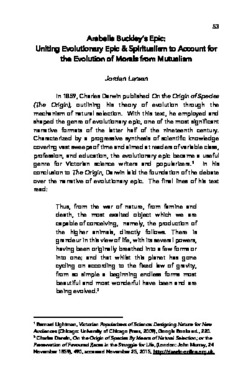| dc.contributor.author | Larsen, Jordan | |
| dc.date.accessioned | 2016-06-12T19:07:51Z | |
| dc.date.accessioned | 2021-04-14T14:30:08Z | |
| dc.date.available | 2016-06-12T19:07:51Z | |
| dc.date.available | 2021-04-14T14:30:08Z | |
| dc.date.issued | 2016 | |
| dc.identifier.uri | https://hdl.handle.net/11244.46/92 | |
| dc.description | Copyright © 2016, The Honors Undergraduate Research Journal, University of Oklahoma. All rights revert to authors. | en_US |
| dc.description.abstract | In 1859, Charles Darwin published On the Origin of Species
(The Origin), outlining his theory of evolution through the
mechanism of natural selection. With this text, he employed and
shaped the genre of evolutionary epic, one of the most significant
narrative formats of the latter half of the nineteenth century.
Characterized by a progressive synthesis of scientific knowledge
covering vast sweeps of time and aimed at readers of variable class,
profession, and education, the evolutionary epic became a useful
genre for Victorian science writers and popularizers. In his
conclusion to The Origin, Darwin laid the foundation of the debate
over the narrative of evolutionary epic. The final lines of his text
read:
"Thus, from the war of nature, from famine and
death, the most exalted object which we are
capable of conceiving, namely, the production of
the higher animals, directly follows. There is
grandeur in this view of life, with its several powers,
having been originally breathed into a few forms or
into one; and that whilst this planet has gone
cycling on according to the fixed law of gravity,
from so simple a beginning endless forms most
beautiful and most wonderful have been and are
being evolved." We encounter Darwin’s epic narrative here: the drama of the “war
of nature, from famine and death,” full of competition, allows his
mechanism, lawful development through natural selection, to result
in the “exalted” higher animals, humans. While Darwin’s diction
provides evidence of his markedly progressive view of evolution,
less clear are his convictions of theism or materialism and of
mutualism or competition in the epic of evolution. Though he added
the phrase “breathed by the Creator” to his second edition of The
Origin a few weeks after the first edition’s publication, whether this
edit reflects a theistic understanding of natural selection or an
attempt to appease theistic readers and friends remains ambiguous.
Subsequent editions of The Origin retained the edit, and apologists
on each side of the evolutionary epic’s theist-materialist debate
retained their positions. | en_US |
| dc.description.abstract | All popularizers of evolution following Charles Darwin
emphasized either the theistic or materialistic version of the
evolutionary epic. While most of his contemporaries interpreted his
theory of natural selection as evidence of competition ruling nature,
science writer and popularizer Arabella Buckley was the first to
characterize Darwin’s theory of the evolution of morals as
mutualistic rather than materialistic, and she did so through a unique
consolidation of evolutionary epic and spiritualism. Barbara T.
Gates, a scholar of Victorian women, has pointed out that a
commitment to the maternal tradition and social responsibility
drove Buckley’s contribution to the evolutionary narrative,
culminating in her emphasis on the mutuality of nature. Historian
of science popularization Bernard Lightman adds that Buckley’s
spiritualistic beliefs directed her popularization through the genre
of evolutionary epic, noting that while Gates provides a detailed
account of Buckley’s narrative techniques and goals, her exclusion
of Buckley’s religion restricts her analysis. In light of the
conversation between these scholars, I aim to demonstrate that the significance of Buckley’s distinctive, mutualistic addition to the
debate on the evolution of morals lies in her theory of traducianism,
neatly unifying evolutionary epic, mutualism, and spiritualism. | en_US |
| dc.description.sponsorship | The Honors Undergraduate Research Journal (THURJ) is a publication of the Joe C. and Carole Kerr McClendon Honors College at the University of Oklahoma. The views expressed in THURJ are solely those of the contributors and should not be attributed to the Editorial Staff, the Honors College, or the University of Oklahoma. | en_US |
| dc.language.iso | en_US | en_US |
| dc.relation.ispartofseries | THURJ: The Honors Undergraduate Research Journal;Volume 15 | |
| dc.rights | Attribution-NonCommercial-ShareAlike 3.0 United States | * |
| dc.rights.uri | https://creativecommons.org/licenses/by-nc-sa/3.0/us/ | * |
| dc.subject | Darwin, Charles | en_US |
| dc.subject | Buckley, Arabella | en_US |
| dc.subject | Mutuality of Nature | en_US |
| dc.title | Arabella Buckley's Epic: Uniting Evolutionary Epic & Spiritualism to Account for the Evolution of Morals from Mutualism | en_US |
| dc.type | Article | en_US |
| dc.description.undergraduate | undergraduate | |

